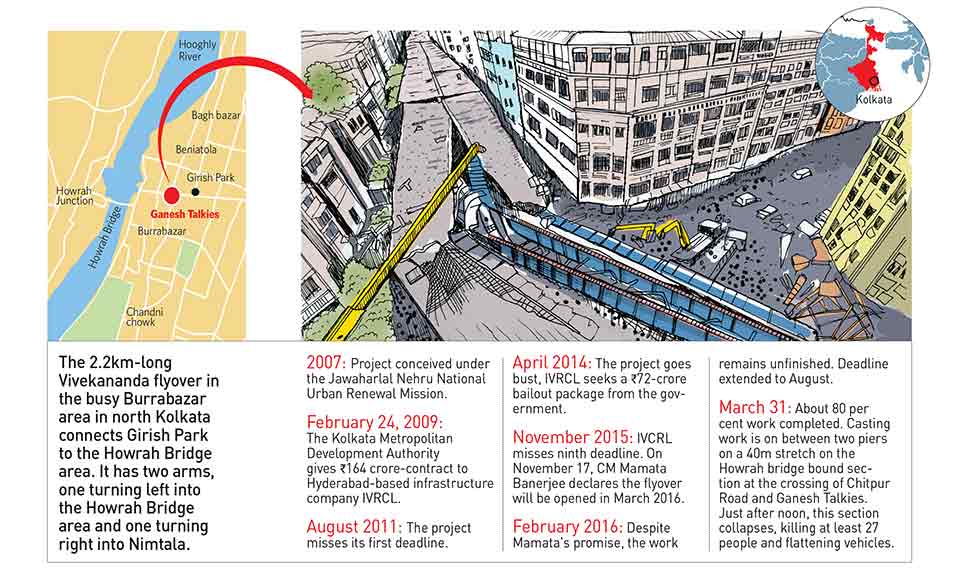Today's pain, tomorrow's gain,” read a signboard at a work site of Vivekananda Setu, the flyover under construction in north Kolkata's Jorasanko neighbourhood. That pain became permanent on March 31, when a section of the flyover collapsed, killing 27 people and injuring many more.
Vivekananda Setu was conceived in 2007 to ease traffic congestion in Burrabazar, the trading hub of Kolkata. On February 24, 2009, the contract for building the flyover was given to IVRCL, a Hyderabad-based construction company, which made the lowest bid of 0164 crore in an all-India tender. Although the project was sanctioned by the Left Front government headed by Buddhadeb Bhattacharjee, work started only after the Trinamool Congress government under Chief Minister Mamata Banerjee came to power in 2011.
The Mamata government started work on two other flyovers—one at the southern end of the eastern metropolitan bypass and the other connecting Park Circus with the eastern metropolitan bypass—which were also cleared by the left government. These two flyovers were inaugurated last year, unlike the ill-fated Vivekananda Setu, which remains incomplete after missing several deadlines.
The project faced a number of hurdles, including financial troubles and delays in land acquisition. On most days, work was possible only from 11pm to 5am since Burrabazar is among the busiest places in Kolkata. But, after the project missed its ninth deadline in November 2015, Mamata declared that the project would be completed by February this year. Pushed by the government, IVRCL asked its workers to speed up the process and finish it before the assembly elections. It turned out to be disastrous.
Apart from the haste, there are allegations that Trinamool leaders have been running a racket supplying substandard construction materials. Though IVRCL is building the flyover, it is said that local Trinamool MLA Smita Bakshi and her husband, Sanjoy, who is a prominent Trinamool leader in Jorasanko, have been supplying construction materials for the project. IVRCL officials said the subcontractor who supplied the materials was Sanjoy's nephew Rajat Bakshi. Local MP Sudip Bandyopadhyay of the Trinamool Congress said he knew the construction was problematic. “I told the government to remodel it. But, by then, a lot of work had taken place for which the government had spent a huge amount of money.”
Local experts said the flyover collapsed because of the use of substandard materials and the incompetence of the workers. IVRCL authorities initially said the collapse was “an act of God”. “But that God was ultimately the local leaders,” said an IVRCL official. “They forced our engineers to buy materials from them. They had a major say in the construction process, too.”
Government officials, however, said unscientific construction was the reason behind the crash. “The entire structure was carried out unscientifically that piers of the flyover shifted their position,” said an official statement. The police have arrested eight IVRCL officers, including A. Gopalakrishnamurthy, the deputy general manager of its project cell. He and four others had come to Kolkata on April 4 to assist the investigation team, but were detained and charged with murder. IVRCL termed it lopsided action. “Unfortunately, that was not at all part of a good investigation,” said a company official.
The demand for the arrest of Sanjoy is growing. But he denied that he was part of the project. “Even though Rajat is my relative, I don’t have any business with the project,” he said. But local people said Sanjoy operated the business from his office in Jorasanko. According to insiders, not just the IVRCL project, but almost all construction and real estate projects in West Bengal are being monitored by Trinamool workers. Many Trinamool workers have started their own business of construction materials, and real estate groups are allegedly being forced to buy from them. These businesses are known as syndicates and only a few big Kolkata-based companies are spared by them. “The situation is horrifying. The businessmen cannot get quality materials. They are forced to buy from Trinamool workers,” said Congress MP Pradip Bhattacharya.
Reportedly, it was what happened in Jorasanko. “IVRCL has the reputation of paying kickbacks for getting projects. So it accepted what Trinamool leaders like Sanjoy Bakshi asked it to do,” said Congress leader Tarak Pal. He said Bakshi took over the project from IVRCL and asked his nephew to monitor it. “Labourers were hired at his instance and syndicate groups were asked to give materials at low cost. On top of it, Mamata asked IVRCL to finish the work as quickly as possible so that she could have another feather in her cap,” he said.
Trinamool MLA Sabyasachi Datta said the syndicates were full of unemployed people who needed jobs. “What is wrong if they get some employment out of it? At least we have tried to address this big problem because of which local youths started their own business. In fact, the economy keeps going because of it,” he said.
Opposition leaders have been quick to seek political mileage from the accident. After visiting the crash site, Congress vice president Rahul Gandhi said he would not like to politicise the issue. But later at a campaign rally in West Midnapore, he blamed the Mamata government. “Just imagine what this government is all about. We have to change things,” said Rahul. Surya Kanta Mishra, state secretary of the CPI(M), agreed that the tragedy should not be politicised. “But we will have to let the people know about the kind of politics being played with whatever little development the state is having,” he said.







